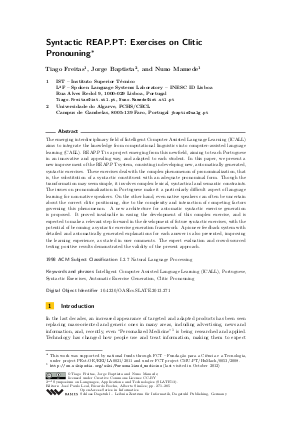Syntactic REAP.PT: Exercises on Clitic Pronouning
Authors Tiago Freitas, Jorge Baptista, Nuno Mamede
-
Part of:
Volume:
2nd Symposium on Languages, Applications and Technologies (SLATE 2013)
Part of: Series: Open Access Series in Informatics (OASIcs)
Part of: Conference: Symposium on Languages, Applications and Technologies (SLATE) - License:
 Creative Commons Attribution 3.0 Unported license
Creative Commons Attribution 3.0 Unported license
- Publication Date: 2013-06-05
File

PDF
OASIcs.SLATE.2013.271.pdf
- Filesize: 0.95 MB
- 15 pages
Document Identifiers
Subject Classification
Keywords
- Intelligent Computer Assisted Language Learning (ICALL)
- Portuguese
- Syntactic Exercises
- Automatic Exercise Generation
- Clitic Pronouning
Metrics
- Access Statistics
-
Total Accesses (updated on a weekly basis)
0PDF Downloads0Metadata Views
Abstract
The emerging interdisciplinary field of Intelligent Computer Assisted Language Learning (ICALL) aims to integrate the knowledge from computational linguistics into computer-assisted language learning (CALL). REAP.PT is a project emerging from this new field, aiming to teach Portuguese in an innovative and appealing way, and adapted to each student. In this paper, we present a new improvement of the REAP.PT system, consisting in developing new, automatically generated, syntactic exercises. These exercises deal with the complex phenomenon of pronominalization, that is, the substitution of a syntactic constituent with an adequate pronominal form. Though the transformation may seem simple, it involves complex lexical, syntactical and semantic constraints. The issues on pronominalization in Portuguese make it a particularly difficult aspect of language learning for non-native speakers. On the other hand, even native speakers can often be uncertain about the correct clitic positioning, due to the complexity and interaction of competing factors governing this phenomenon. A new architecture for automatic syntactic exercise generation is proposed. It proved invaluable in easing the development of this complex exercise, and is expected to make a relevant step forward in the development of future syntactic exercises, with the potential of becoming a syntactic exercise generation framework. A pioneer feedback system with detailed and automatically generated explanations for each answer is also presented, improving the learning experience, as stated in user comments. The expert evaluation and crowd-sourced testing positive results demonstrated the validity of the present approach.
Cite As Get BibTex
Tiago Freitas, Jorge Baptista, and Nuno Mamede. Syntactic REAP.PT: Exercises on Clitic Pronouning. In 2nd Symposium on Languages, Applications and Technologies. Open Access Series in Informatics (OASIcs), Volume 29, pp. 271-285, Schloss Dagstuhl – Leibniz-Zentrum für Informatik (2013)
https://doi.org/10.4230/OASIcs.SLATE.2013.271
BibTex
@InProceedings{freitas_et_al:OASIcs.SLATE.2013.271,
author = {Freitas, Tiago and Baptista, Jorge and Mamede, Nuno},
title = {{Syntactic REAP.PT: Exercises on Clitic Pronouning}},
booktitle = {2nd Symposium on Languages, Applications and Technologies},
pages = {271--285},
series = {Open Access Series in Informatics (OASIcs)},
ISBN = {978-3-939897-52-1},
ISSN = {2190-6807},
year = {2013},
volume = {29},
editor = {Leal, Jos\'{e} Paulo and Rocha, Ricardo and Sim\~{o}es, Alberto},
publisher = {Schloss Dagstuhl -- Leibniz-Zentrum f{\"u}r Informatik},
address = {Dagstuhl, Germany},
URL = {https://drops.dagstuhl.de/entities/document/10.4230/OASIcs.SLATE.2013.271},
URN = {urn:nbn:de:0030-drops-40433},
doi = {10.4230/OASIcs.SLATE.2013.271},
annote = {Keywords: Intelligent Computer Assisted Language Learning (ICALL), Portuguese, Syntactic Exercises, Automatic Exercise Generation, Clitic Pronouning}
}
